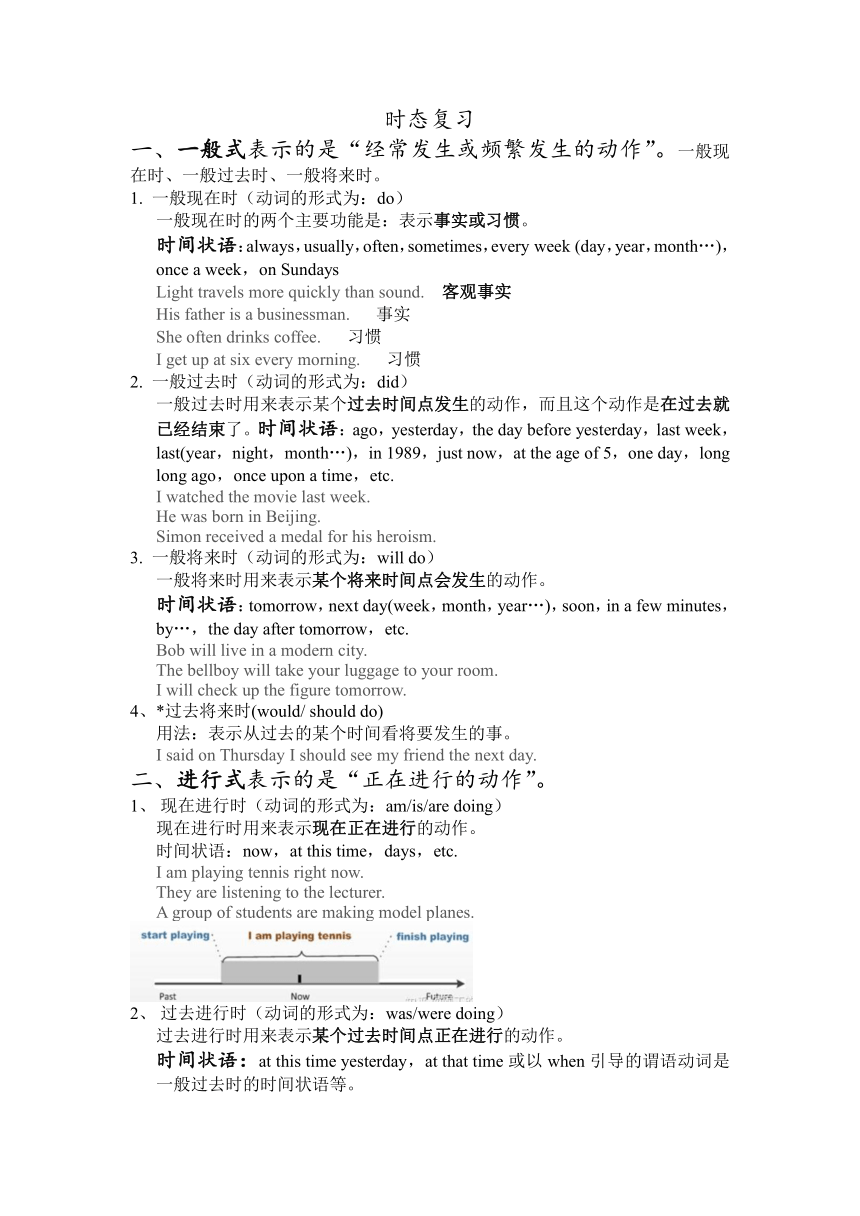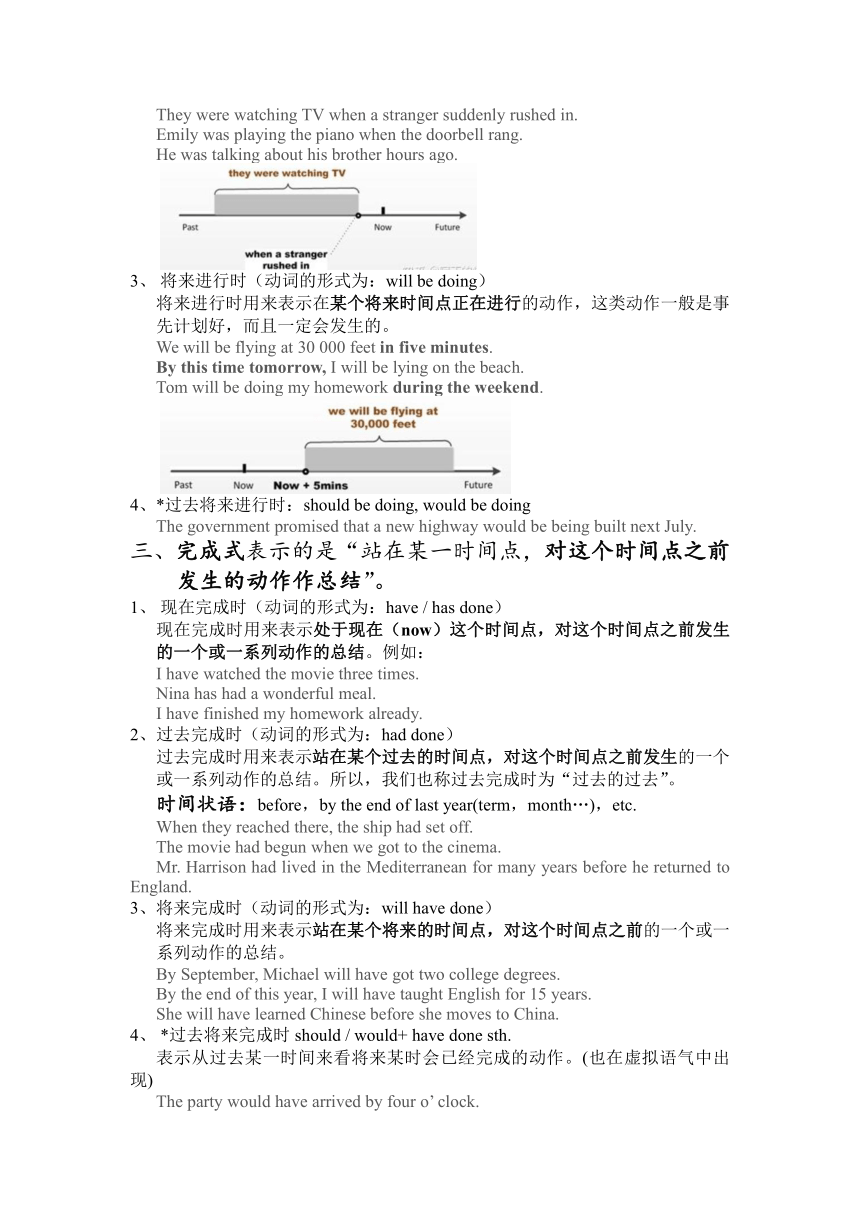2023届高三英语二轮复习: 时态讲义
文档属性
| 名称 | 2023届高三英语二轮复习: 时态讲义 |

|
|
| 格式 | zip | ||
| 文件大小 | 524.6KB | ||
| 资源类型 | 教案 | ||
| 版本资源 | 通用版 | ||
| 科目 | 英语 | ||
| 更新时间 | 2022-08-01 00:00:00 | ||
图片预览


文档简介
时态复习
一、一般式表示的是“经常发生或频繁发生的动作”。一般现在时、一般过去时、一般将来时。
1. 一般现在时(动词的形式为:do)
一般现在时的两个主要功能是:表示事实或习惯。
时间状语:always,usually,often,sometimes,every week (day,year,month…),once a week,on Sundays
Light travels more quickly than sound. 客观事实
His father is a businessman. 事实
She often drinks coffee. 习惯
I get up at six every morning. 习惯
2. 一般过去时(动词的形式为:did)
一般过去时用来表示某个过去时间点发生的动作,而且这个动作是在过去就已经结束了。时间状语:ago,yesterday,the day before yesterday,last week,last(year,night,month…),in 1989,just now,at the age of 5,one day,long long ago,once upon a time,etc.
I watched the movie last week.
He was born in Beijing.
Simon received a medal for his heroism.
3. 一般将来时(动词的形式为:will do)
一般将来时用来表示某个将来时间点会发生的动作。
时间状语:tomorrow,next day(week,month,year…),soon,in a few minutes,by…,the day after tomorrow,etc.
Bob will live in a modern city.
The bellboy will take your luggage to your room.
I will check up the figure tomorrow.
4、*过去将来时(would/ should do)
用法:表示从过去的某个时间看将要发生的事。
I said on Thursday I should see my friend the next day.
二、进行式表示的是“正在进行的动作”。
现在进行时(动词的形式为:am/is/are doing)
现在进行时用来表示现在正在进行的动作。
时间状语:now,at this time,days,etc.
I am playing tennis right now.
They are listening to the lecturer.
A group of students are making model planes.
过去进行时(动词的形式为:was/were doing)
过去进行时用来表示某个过去时间点正在进行的动作。
时间状语:at this time yesterday,at that time或以when引导的谓语动词是一般过去时的时间状语等。
They were watching TV when a stranger suddenly rushed in.
Emily was playing the piano when the doorbell rang.
He was talking about his brother hours ago.
将来进行时(动词的形式为:will be doing)
将来进行时用来表示在某个将来时间点正在进行的动作,这类动作一般是事先计划好,而且一定会发生的。
We will be flying at 30 000 feet in five minutes.
By this time tomorrow, I will be lying on the beach.
Tom will be doing my homework during the weekend.
4、*过去将来进行时:should be doing, would be doing
The government promised that a new highway would be being built next July.
三、完成式表示的是“站在某一时间点,对这个时间点之前发生的动作作总结”。
现在完成时(动词的形式为:have / has done)
现在完成时用来表示处于现在(now)这个时间点,对这个时间点之前发生的一个或一系列动作的总结。例如:
I have watched the movie three times.
Nina has had a wonderful meal.
I have finished my homework already.
2、过去完成时(动词的形式为:had done)
过去完成时用来表示站在某个过去的时间点,对这个时间点之前发生的一个或一系列动作的总结。所以,我们也称过去完成时为“过去的过去”。
时间状语:before,by the end of last year(term,month…),etc.
When they reached there, the ship had set off.
The movie had begun when we got to the cinema.
Mr. Harrison had lived in the Mediterranean for many years before he returned to England.
3、将来完成时(动词的形式为:will have done)
将来完成时用来表示站在某个将来的时间点,对这个时间点之前的一个或一系列动作的总结。
By September, Michael will have got two college degrees.
By the end of this year, I will have taught English for 15 years.
She will have learned Chinese before she moves to China.
*过去将来完成时should / would+ have done sth.
表示从过去某一时间来看将来某时会已经完成的动作。(也在虚拟语气中出现)
The party would have arrived by four o’ clock.
She said she’ d have finished her exams by then.
If I'd left sooner, I'd have been on time. (虚拟)
四、完成进行式是完成式与进行式的结合,表示的是“对一个正在进行动作的总结”。一般与for和since连用。
1、现在完成进行时(动词的形式为:have / has been doing)
现在完成进行时用来表示对一个现在正在进行动作的总结。
Tom has been playing football for two hours. ⑨
Simon have been working on the project for several years.
I have been waiting for this day since I was a boy.
过去完成进行时(动词的形式为:had been doing)
过去完成进行时用来表示站在某个过去的时间点,对这个时间点正在进行动作的总结。
I had been cleaning my room the whole morning when she came.
The players had been playing for 20 minutes by the time we arrived at the tennis hall.
We had been waiting for two hours outside when allowed to enter the room.
将来完成进行时(动词的形式为:will have been doing)
将来完成进行时用来表示站在某个将来的时间点,对这个时间点正在进行动作的总结。
I will have been doing the drawing for 5 hours at 11 pm.
By this summer, he will have been training horses for 10 years.
By September the play will have been running for three months.
过去将来完成进行时 would have been doing
表动作从过去某一时间开始一直延续到过去将来某一时间。动作是否继续下去,由上下文决定。
I heard by July you’d have been teaching here for ten years.\
He said that by the end of the spring term he would have been studying English for three years.
I knew by that time he would have been working there for 30 years.
一般式(时) 进行式(时) 完成式(时) 完成进行式(时)
现在 do be doing have/has done have been doing
过去 did be(过去) doing had done had been doing
将来 will do will be doing will have done will have been doing
*过去将来 would do would be doing would have done would have been doing
一、一般式表示的是“经常发生或频繁发生的动作”。一般现在时、一般过去时、一般将来时。
1. 一般现在时(动词的形式为:do)
一般现在时的两个主要功能是:表示事实或习惯。
时间状语:always,usually,often,sometimes,every week (day,year,month…),once a week,on Sundays
Light travels more quickly than sound. 客观事实
His father is a businessman. 事实
She often drinks coffee. 习惯
I get up at six every morning. 习惯
2. 一般过去时(动词的形式为:did)
一般过去时用来表示某个过去时间点发生的动作,而且这个动作是在过去就已经结束了。时间状语:ago,yesterday,the day before yesterday,last week,last(year,night,month…),in 1989,just now,at the age of 5,one day,long long ago,once upon a time,etc.
I watched the movie last week.
He was born in Beijing.
Simon received a medal for his heroism.
3. 一般将来时(动词的形式为:will do)
一般将来时用来表示某个将来时间点会发生的动作。
时间状语:tomorrow,next day(week,month,year…),soon,in a few minutes,by…,the day after tomorrow,etc.
Bob will live in a modern city.
The bellboy will take your luggage to your room.
I will check up the figure tomorrow.
4、*过去将来时(would/ should do)
用法:表示从过去的某个时间看将要发生的事。
I said on Thursday I should see my friend the next day.
二、进行式表示的是“正在进行的动作”。
现在进行时(动词的形式为:am/is/are doing)
现在进行时用来表示现在正在进行的动作。
时间状语:now,at this time,days,etc.
I am playing tennis right now.
They are listening to the lecturer.
A group of students are making model planes.
过去进行时(动词的形式为:was/were doing)
过去进行时用来表示某个过去时间点正在进行的动作。
时间状语:at this time yesterday,at that time或以when引导的谓语动词是一般过去时的时间状语等。
They were watching TV when a stranger suddenly rushed in.
Emily was playing the piano when the doorbell rang.
He was talking about his brother hours ago.
将来进行时(动词的形式为:will be doing)
将来进行时用来表示在某个将来时间点正在进行的动作,这类动作一般是事先计划好,而且一定会发生的。
We will be flying at 30 000 feet in five minutes.
By this time tomorrow, I will be lying on the beach.
Tom will be doing my homework during the weekend.
4、*过去将来进行时:should be doing, would be doing
The government promised that a new highway would be being built next July.
三、完成式表示的是“站在某一时间点,对这个时间点之前发生的动作作总结”。
现在完成时(动词的形式为:have / has done)
现在完成时用来表示处于现在(now)这个时间点,对这个时间点之前发生的一个或一系列动作的总结。例如:
I have watched the movie three times.
Nina has had a wonderful meal.
I have finished my homework already.
2、过去完成时(动词的形式为:had done)
过去完成时用来表示站在某个过去的时间点,对这个时间点之前发生的一个或一系列动作的总结。所以,我们也称过去完成时为“过去的过去”。
时间状语:before,by the end of last year(term,month…),etc.
When they reached there, the ship had set off.
The movie had begun when we got to the cinema.
Mr. Harrison had lived in the Mediterranean for many years before he returned to England.
3、将来完成时(动词的形式为:will have done)
将来完成时用来表示站在某个将来的时间点,对这个时间点之前的一个或一系列动作的总结。
By September, Michael will have got two college degrees.
By the end of this year, I will have taught English for 15 years.
She will have learned Chinese before she moves to China.
*过去将来完成时should / would+ have done sth.
表示从过去某一时间来看将来某时会已经完成的动作。(也在虚拟语气中出现)
The party would have arrived by four o’ clock.
She said she’ d have finished her exams by then.
If I'd left sooner, I'd have been on time. (虚拟)
四、完成进行式是完成式与进行式的结合,表示的是“对一个正在进行动作的总结”。一般与for和since连用。
1、现在完成进行时(动词的形式为:have / has been doing)
现在完成进行时用来表示对一个现在正在进行动作的总结。
Tom has been playing football for two hours. ⑨
Simon have been working on the project for several years.
I have been waiting for this day since I was a boy.
过去完成进行时(动词的形式为:had been doing)
过去完成进行时用来表示站在某个过去的时间点,对这个时间点正在进行动作的总结。
I had been cleaning my room the whole morning when she came.
The players had been playing for 20 minutes by the time we arrived at the tennis hall.
We had been waiting for two hours outside when allowed to enter the room.
将来完成进行时(动词的形式为:will have been doing)
将来完成进行时用来表示站在某个将来的时间点,对这个时间点正在进行动作的总结。
I will have been doing the drawing for 5 hours at 11 pm.
By this summer, he will have been training horses for 10 years.
By September the play will have been running for three months.
过去将来完成进行时 would have been doing
表动作从过去某一时间开始一直延续到过去将来某一时间。动作是否继续下去,由上下文决定。
I heard by July you’d have been teaching here for ten years.\
He said that by the end of the spring term he would have been studying English for three years.
I knew by that time he would have been working there for 30 years.
一般式(时) 进行式(时) 完成式(时) 完成进行式(时)
现在 do be doing have/has done have been doing
过去 did be(过去) doing had done had been doing
将来 will do will be doing will have done will have been doing
*过去将来 would do would be doing would have done would have been doing
